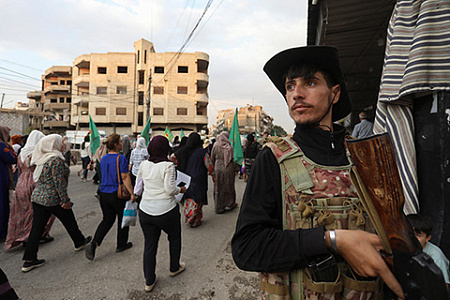
Kurdish-led representatives and Syria’s transitional government resumed critical negotiations in Damascus on August 12, even as their armed forces continued to clash on the ground. The high-stakes dialogue, aimed at integrating the autonomous Kurdish-controlled northeast into a unified Syrian state, is fraught with tension, with experts warning that persistent disagreements could deepen the country’s civil fractures.
A delegation from the Syrian Democratic Forces (SDF), a military alliance dominated by Kurdish groups, arrived in the capital to restart the talks. Delegation head Ilham Ahmed, a senior SDF foreign relations official, tempered expectations by describing the engagement as a “form of dialogue” that has not yet reached the level of official negotiations, stressing its role in addressing the broader challenge of Syria’s future political framework.
The discussions were immediately overshadowed by violence. Just hours before the talks began, a Syrian soldier was killed in a skirmish east of Aleppo. Syria’s Ministry of Defense claimed that two SDF-affiliated groups attempted to infiltrate army positions, prompting a deadly firefight. Damascus accused the SDF of persistently attacking its military posts, while the SDF command blamed the government for provocations, warning that it would respond in “legitimate self-defense” and urging Damascus not to jeopardize prior agreements.
This fragility persists despite earlier diplomatic breakthroughs. On March 10, transitional President Ahmed al-Sharaa and SDF commander Mazloum Abdi signed a landmark agreement for all civil and military facilities in the northeast, including airports and crucial oil and gas fields, to be transferred to state control by the end of the year. A second US-mediated deal in April established a joint security structure for northern enclaves and provisions for prisoner exchanges.
However, trust has been repeatedly undermined. In July, Damascus suspended separate talks in France after accusing the SDF of supporting Druze militias in southern Syria. The SDF has indeed strengthened ties with Druze forces in the Suwayda province, who are also pushing for regional autonomy under the leadership of Sheikh Hikmat al-Hijri, creating a new challenge for the central government’s authority.
The transitional administration in Damascus, strongly supported by its key international partner Turkey, views this emerging SDF-Druze cooperation as a direct threat to national sovereignty. Ankara and Damascus accuse the SDF of violating the March agreement and attempting to create a logistical corridor to supply armed factions in the south.
According to an analysis by the Institute for the Study of War (ISW), the relationship is defined by an “extreme mistrust” that continues to sabotage integration efforts. The US-based think tank warns that this deep-seated suspicion means that even a minor ceasefire violation could spiral out of control due to poor communication and mutual suspicion, potentially reigniting a full-scale conflict with very little-to-no provocation.
